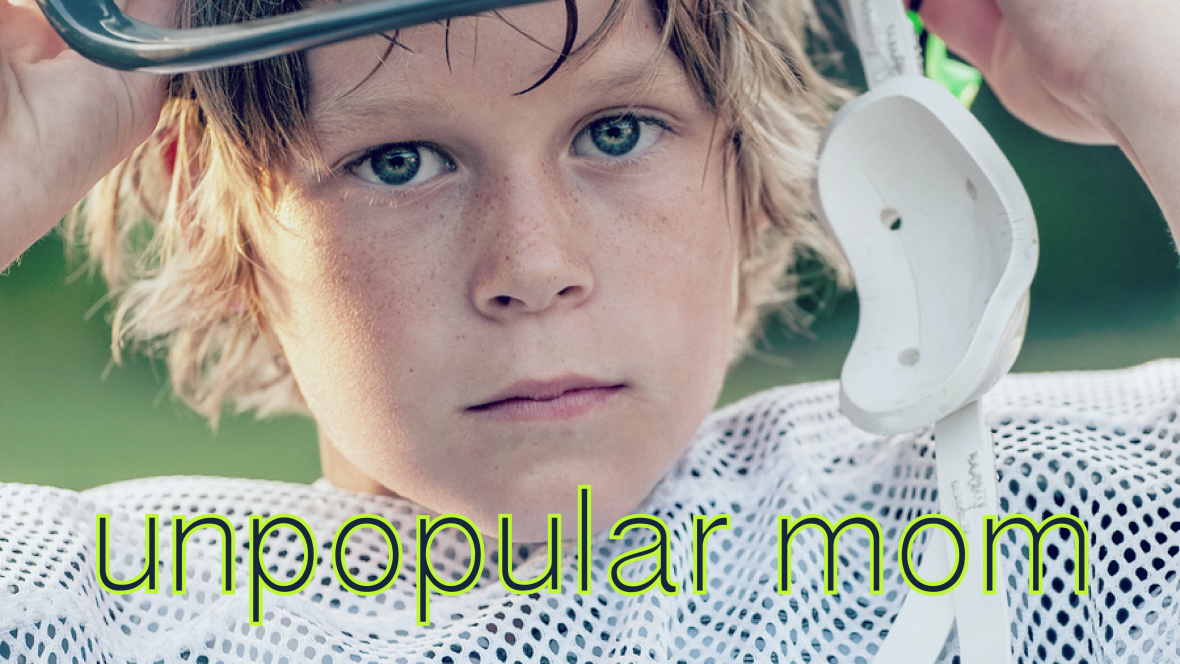“Your child’s success or lack of success in sports does not indicate what kind of parent you are. But, having an athlete that is coachable, respectful, a great teammate, mentally tough, resilient, and who tries their best is a direct reflection of your parenting.”
Oh, just shut up. Really.
I’ve seen this sign crop up more than a few times in my Facebook feed, and every single time I think: listen, you sanctimonious super-parent-slash-sign-maker—you are wrong, and you’re not helping anyone.
Let’s think about it, for a moment. Kids come in all shapes and sizes, and are blessed with all manner of abilities and personalities. No two children are alike, and yet, if for some reason your child is not quite coachable, respectful, mentally tough….the list goes on, then you have failed?
That’s what this sign is telling me.
I call bullshit.
My son is eight years old, neuro-typical, a pretty good athlete and, sometimes, a spectacularly bad sport. He has thrown his helmet, he’s thrown his glove, he’s even thrown his batting gloves—which I can’t imagine would be all that satisfying. He’s kicked dirt. He wants to be the best, he wants to win, and hell hath no fury like my child when a game isn’t going his way.
“You have to look at the parents,” I’ve heard people say, shaking their heads sadly. And yes, we’ve all seen parents who berate their children from the sidelines for poor performance. We’ve seen parents who are disrespectful toward everyone, demonstrating to their kids that respectfulness is optional, at best. We’ve seen parents who fight with coaches, with umpires, with each other. I know signs like this are meant to remind parents to ease up, stop yelling, cease living vicariously through your kid. Don’t take the fun out of it. Don’t be an asshole.
The trouble, as I see it, is that the actual assholes never believe they are the assholes. And therefore, the lesson is lost.
Still, I’ve looked at these parents. And I’ve considered myself and my husband quite a bit in this regard, wondering what we’re doing/have done wrong. I’ve spoken to parents of other ‘poor sports’, and what I have seen, by and large, are parents who are trying really hard to deal with a child whose personality “flaw” is regularly on public display. We’ve also tried everything—from punishment to positive reinforcement—to get our kids to ease up, have fun. Some have tried therapy. All have tried talking to their child, often ad nauseum and the end result is the same: no change.
So tell me, sign-maker, what’s a parent to do? How do we change a person? Your sign tells me that my parenting has made my child’s personality and temperament, a notion that is laughably simplistic at best. You’re telling me I’m doing it wrong, but you’re not offering suggestions. You’ve discounted the years of struggles we’ve had as parents and completely ignored that every child is different—and not a single one of them is mom-sign perfect.
Our kids are our kids, but that’s not all they are. They’re human beings, they’re individuals, they have strengths and flaws and cute mannerisms and weird quirks. This poor sport of mine? Almost never whines. He does very well in school and rarely complains about homework. He helps with housework. He tries hard to make me laugh. He has never once had a temper tantrum in Target, not even when he was a toddler. He sings me songs and does funny dances. He’s a good kid, a good athlete, and a terrible sport.
So, yeah. You do have to look at the parents. But maybe once in a while, it’d be good to look at them with compassion and consideration, instead of immediately leaping to criticism. To feel grateful for your own child’s good qualities, without dumping that ugly smugness all over everything. To stop blindly putting other parents down when the fact is, in almost every situation, you really just don’t know. You don’t know what’s going on in the next mom’s yard. And you don’t know who’s peeking through the fence at yours. So the next time my kid throws his helmet and you say, “You have to look at the parents,” look around you first for the woman in the beat-up blue chair. Because chances are, I’m right there.




Every time he throws a helmet, glove or kicks dirt he is having a tantrum. It doesn’t matter what name you lay on it…he’s having a fit because things didn’t go his way. Whether it’s in Target or on a sporting field it’s a tantrum. A two year old in Target is more understandable than a child old enough to know better throwing a glove. It’s a pretty safe bet that that kid also doesn’t do much to build up his teammates when they fail to reach their goal. Certainly kids should be permitted to be angry but there is something to be said for teaching them the manners not to make a spectacle of themselves. Letting them know that they aren’t “cool” for abusing equipment and it looks ridiculous when they do is probably a better idea than saying “that’s my Johnny…what can I do?” By this time it’s probably too late to teach your kids manners and self control so you’re best response now surely is…”that’s my boy and I love him…but it isn’t my fault”.
I think it’s pretty clear that the author isn’t a. endorsing her child’s bad sportsmanship or b. sitting back while it takes place. She’s clearly discussing the judgemental parents who assume that’s what she and other parents of children who have behavioural quirks that are difficult to change are doing. At the end of the day, we all do our best with our children, but they’re also individual humans who have their strengths and weaknesses.
Bob – I don’t know if you understood – we’ve tried everything. We continue to try. Not one of the ‘bad sport’ parents I know has said, “That’s my Johnny… what can I do?” But I do believe that’s the common perception — that we’re all just sitting out there, clucking our tongues and saying, oh, well, I’d rather “let” him be this way than to put in any effort. Not my fault! Not my problem!
Make no mistake. We are putting in huge efforts. Sometimes, it just doesn’t help. As I suspect can be said for kids who have different issues, behavioral or otherwise.
Thanks for reading.
I have an occasional bad sport. And I am in no way making excuses for him. But he has more going on than meets the eye…all of which are being addressed, AGGRESSIVLY. Him getting mad and kicking dirt on a bad play or a lost game doesn’t bother me one bit. It is who he is and I personally feel it shows he has heart for the game and is a true competitor. Good qualities for later in life. However, making a spectacle and not being a good teammate is what we work on. Being criticle of yourself is one thing, being criticle of teammates is another. And even after a loss, he is taught to take his hat off and shake hands and be respectful. He is taught to encourage his teammates. He is taught to respect his coaches. Though, this doesn’t always happen, I can assure you, our convos on the way to games have nothing to do with “head down, quick hands, use your hips…” They have everything to do with, “be loud out there. Be a leader. Be proud of your friends/teammates when they make a good play and let them know how excited you are…and most importantly, I love to watch you play baseball, and I love when you are happy on that field.” Trust me. It is not always the parents fault.
Cassie – totally agree. And it’s funny to me how the world expects kids to not care about winning and losing, yet the NFL, NHL etc make billions every year. BECAUSE EVERYONE CARES ABOUT WINNING. Yet we expect little kids to behave better than adults. Anyway…thanks for the comment
This was a great read! As a mother of three competitive and athletic boys I can attest parenting is not always to blame. We’ve tried everything to help one of ours who is a “bad sport,” and while he has made small strides, it is still a battle. We have wondered what we are doing wrong since our other two are easy-going, “good sports.” It’s exhausting; there have been many tears shed all around, and so many doubts on our end. Thanks for writing this and saying how I’ve felt for so long now!
Thank you, for reading and commenting! I too have another player who smiles no matter what…he’s one year younger than the “bad sport,” and I’ve thought, did my parenting technique really change that much in one year?? At any rate, I’m glad to know this resonated with you, always good to know you’re not alone in the trenches.
Parenting can only go so far. I have a daughter that is especially competitive and one that could care less and is just there to make friends and have fun. I have seen my competitive daughter being a “bad sport” a handful of times and thought “Does she see me or her father act like that”? “What are we doing wrong”? So glad I’m not the only one. It’s exhausting watching all of the other parents shoot their shitty looks my way. Thanks for writing this! Love reading your insight.
Thanks for reading! We’re all doing something wrong I think the trouble may be that we give ourselves too much credit for the bad qualities as well as the good. Children are not blank slates that we get to make into whatever we want, but many people seem to believe that’s exactly what they are. Keep up the good work and shoot a smile as those bastards who send the shitty looks your way.
I think the trouble may be that we give ourselves too much credit for the bad qualities as well as the good. Children are not blank slates that we get to make into whatever we want, but many people seem to believe that’s exactly what they are. Keep up the good work and shoot a smile as those bastards who send the shitty looks your way.
[…] nor is equipment, gas to travel, and food to bring along. I told her I don’t appreciate her taking it for granted. She quickly realized she could take a break, thought about it, and hopped up and was a happy […]